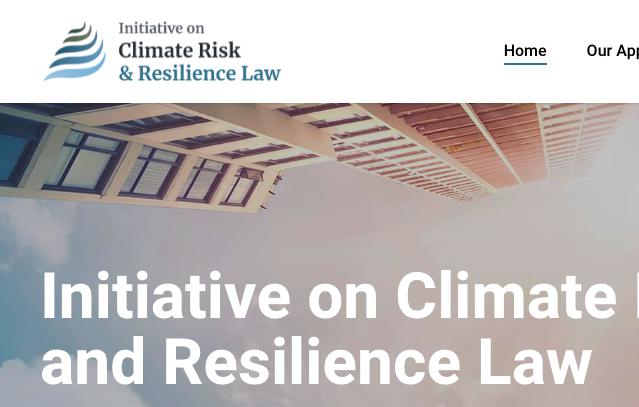New Group Calls on SEC to Strengthen Climate Protections for U.S. Financial System
Experts with the brand new Initiative on Climate Risk and Resilience Law (ICRRL) are calling on the Securities and Exchange Commission to strengthen protections from the dangers of climate change to our nation’s financial system and the millions of people who rely on it to sustain the American economy.
ICRRL is a joint initiative of Columbia Law School’s Sabin Center for Climate Change Law, Environmental Defense Fund, the Institute for Policy Integrity at New York University School of Law, and Vanderbilt Law School. The partnership was formed to drive legal solutions that address societal and economic risks from climate change and to improve climate resilience, including in our financial sectors. ICRRL’s work formally got underway today with the launch of its new website – and with an SEC filing detailing its recommendations for climate change disclosure for businesses.
“Climate change presents grave risk across the U.S. economy, including to corporations, their investors, the markets in which they operate, and the American public at large. Unlike other financial risks, however, climate risk is not routinely disclosed to the public,” ICRRL states in its filing. “The SEC should adopt an approach that recognizes the importance of discussing climate risks in financial disclosure forms. Many impacts of climate change can be quantified and monetized, and should therefore be treated no differently than other financial risks.”
The SEC called for public input about climate change disclosures in March in an announcement that included 15 questions for consideration. Today ICRRL filed its response to that request. Among its recommendations:
· The Commission should establish mandatory climate risk disclosure requirements that produce comparable, specific, and decision-useful information for investors.
· The Commission should move quickly to establish these climate risk disclosure requirements.
· Climate risk disclosure and carbon markets are complementary policies, not substitutes.
· The Commission should solicit stakeholder input on standards, but industry participants should not have the final say.
· Industry-specific standards will help ensure that investors receive sufficiently specific and decision-useful information.
· The Commission should dedicate additional resources to enforcement and subject certain climate risk disclosures to auditing.
ICRRL also recommended adding climate risk line items to financial statements that would allow investors to know, for instance, the value of all climate pollution-producing assets owned or managed by a corporation, the total properties or other assets owned in 100-year flood zones or wildfire-prone areas, any fines or sanctions for non-compliance with environmental laws and regulation, and any plans to reduce climate pollution.
“There is widespread demand for climate risk disclosure among investors,” ICRRL states in its filing. “The proliferation of voluntary standards, many of which have already received considerable buy-in, indicates that the creation of and compliance with robust climate risk disclosure standards is already feasible for both regulators and corporations.”
You can read all of ICRRL’s recommendations in its full filing here. The Sabin Center, an ICCRL partner, also filed separate comments with the SEC here.
ICRRL’s experts include: Romany Webb, an Associate Research Scholar at Columbia Law School and Senior Fellow at the Sabin Center for Climate Change Law whose research focuses on energy and negative emissions technologies; Michael Panfil, the Director of Climate Risk Strategies at Environmental Defense Fund; Justin Gundlach, an attorney who focuses on state-level energy and climate policy at the Institute for Policy Integrity; and Jack Lienke, an expert on the U.S. Clean Air Act and federal environmental and administrative law at the Institute for Policy Integrity; Jim Rossi, an expert on administrative and energy law at Vanderbilt Law School.
You can read more about ICRRL and its experts and explore some of the work they’ve done so far, on their new website.
